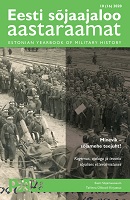Miks peaksid elukutselised sõjaväelased õppima antiik- ja keskaja sõjaajalugu?
Why should professional soldiers study ancient and medieval military history?
Author(s): Clifford J. RogersContributor(s): Toomas Hiio (Translator)
Subject(s): Military history, Social history, Ancient World, 6th to 12th Centuries, 13th to 14th Centuries, 15th Century
Published by: Tallinna Ülikooli Kirjastus
Keywords: professional soldiers; military history; medieval military history; ancient military history;
Summary/Abstract: There is a general belief that the study of military history is an indispensable part of an officer's education. Although many successful military leaders, including Napoleon and MacArthur, have highlighted their extensive reading, which extended to ancient authors, Clausewitz wrote: “The further back we go in time, the less useful military history we get.” This article argues the opposite: officers have a lot win if they incorporate premodern warfare into their studies. Wider and more diverse examples and the selection of case studies allows for more reliable generalization, offers more sources of inspiration, and helps to avoid the tempting but unreasonable assumption that the next war will be similar to the last one, as well as the equally tempting and unreasonable assumption that victory is guaranteed by material strength alone. Furthermore, scholars of antiquity and medieval warfare must contend with scarce and conflicting data and facts, as do officers applying the basic knowledge of their specialized training in battle. Premodern history, like war, is an uncertain reality: many "facts" can only be called probabilities. The best preparation for being able to see through the fog of war would therefore be to practice peering through the mists of time.
Journal: Eesti Sõjaajaloo Aastaraamat
- Issue Year: 10/2020
- Issue No: 1
- Page Range: 11-30
- Page Count: 20
- Language: Estonian

